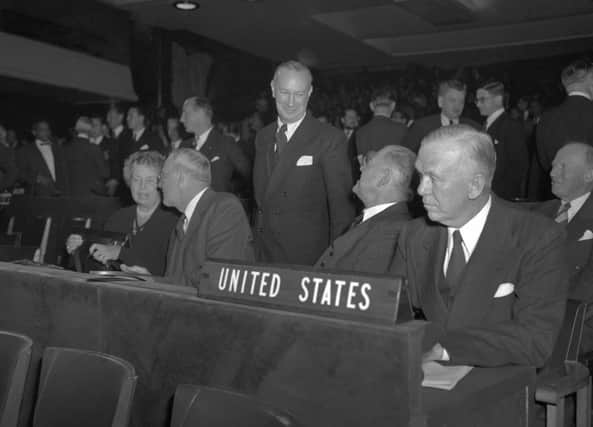Human rights should start right here


“WHERE after all do universal human rights begin? In small places close to home – so close and so small they cannot be seen on any maps of the world. Yet they are the world of the individual person…Unless these rights have meaning there, they have little meaning anywhere. Without concerted citizen action to uphold them close to home, we shall look in vain for progress in the larger world.”
(Eleanor Roosevelt, “In Our Hands”, speech delivered in 1958 on tenth anniversary of the Universal Declaration on Human Rights)
Advertisement
Hide AdAdvertisement
Hide AdThe past year has been a significant one in Scotland. Levels of civic engagement stimulated by the referendum reflect real dissatisfaction with aspects of Scottish society, as well as hope for something better. To the fore in the referendum debate, on all sides, was a passionate call for change; for action on poverty, inequality and the severe marginalisation faced by many of our citizens, despite our relative wealth as a country. The issues that people seemed to care most strongly about reflect the vision of Scotland’s National Action Plan for Human Rights (SNAP), which aspires to “a Scotland in which everyone is able to live with human dignity”.
Disabled people and people with long-term conditions frequently describe their experiences of being denied human dignity in their daily lives. At their most fundamental level, human rights are about being human, being equal and being treated as such. Many people experience stigma and exclusion, harassment or even violence as a result of being seen as “different” or of lesser value than others.
At an ALLIANCE event last year, a man with learning disabilities described powerfully why human rights matter to him; he wanted to be viewed as “human and equal”, instead of “different and other”. A range of recent research points to worsening stigma and discrimination, at least in part due to the public and media discourse on welfare reform.
There is no doubt too that disabled people and people with long-term conditions are being forced to carry a significant proportion of the burden of austerity. People’s rights to health and to participate as citizens in society are being undermined by cuts to welfare benefits, reductions in access to services and the requirement for people to pay more towards their social care support. Many argue that paying for social care at all is deeply unfair and that we need an honest debate about what should be funded through the public purse.
If people are to be able to live with human dignity, human rights need much more fundamentally to inform all that we do, both in policy and practice. The ALLIANCE and others have called for the Smith Commission to place human rights at the heart of its deliberations; devolving further powers with the purpose of enabling Scotland to create a fairer, more equal society. The Scottish Government has committed to a human rights- based approach to health and social care integration and we believe that can help bridge the cultural differences between the sectors, focusing on the outcomes for people, not systems, and sharpening attention on health inequalities.
We, with NHS Health Scotland and others, are working with people who use health and social care services and those who design and deliver them to help understand what it means in practice to take a human rights-based approach. This connects strongly with work on self-management and builds on the history of human rights-based approaches in mental health recovery, independent living and dementia. All of these approaches begin with the person and recognise their rights to health, to participation in their community and to have choice and control over their own lives. More widely, a human rights-based approach strongly reflects the shift in relationship between citizen and state, encapsulated in the Christie Report and in the drive for engaged citizens, co-production and community empowerment.
SNAP will have its first anniversary on International Human Rights Day on 10 December. In its research to inform SNAP, the Scottish Human Rights Commission (SHRC) identified three foundations upon which we need to build: empowerment, ability and accountability. People need opportunities to learn about their human rights and the power to participate in decisions and processes that affect their lives; those making decisions or delivering public services must have the ability to put human rights into practice; and there must be accountability at all levels for ensuring people’s rights are respected.
Above all, we must remember that human rights belong to us all, and ensure that rights are increasingly a reality in the “small places, close to home”. There is no reason why Scotland should not be a country where everyone can live with human dignity and every reason for us to strive to achieve that vision.
• Shelley Gray is director of policy and communications at Health and Social Care Alliance Scotland (the ALLIANCE)